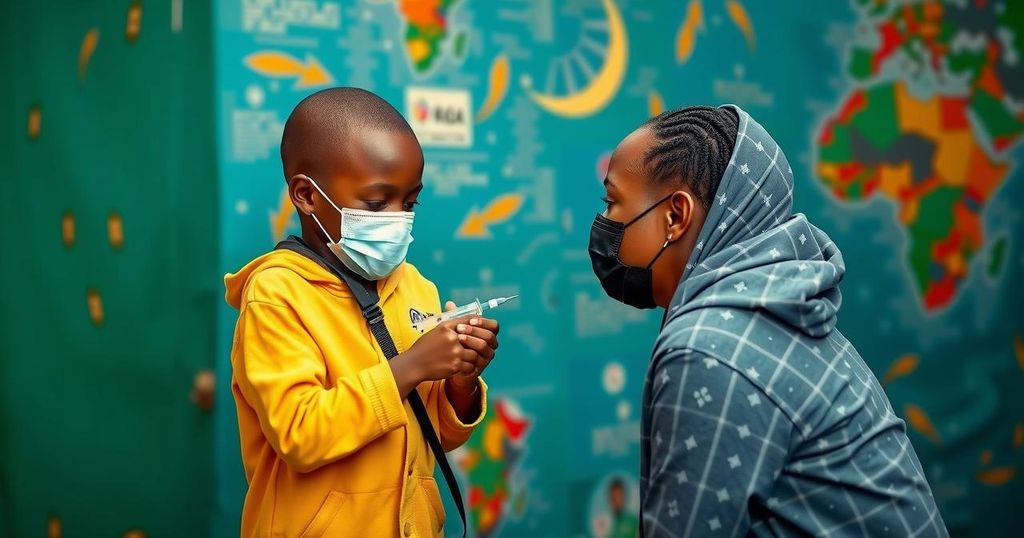Lifestyle
AFRICA, BUNGOMA DISTRICT, CHARLES NJUGUNA, DANIEL KYABAYINZE, DISEASE OUTBREAK, DISEASE OUTBREAKS, GPEI, HEALTH, HUMANITARIAN, HUMANITARIAN AID, KAMPALA, KENYA, MBALE DISTRICT, MINISTRY OF HEALTH OF, MINISTRY OF HEALTH OF UGANDA, NAIROBI, TRAVEL ADVISORY, UGANDA, WHO, WORLD HEALTH ORGANIZATION
Elena Martinez
0 Comments
Kenya and Uganda Achieve Successful Cross-Border Polio Vaccination Campaign
A synchronized polio vaccination campaign in Kenya and Uganda successfully vaccinated over 6.5 million children from October 3-6, 2024. Prompted by recent cases of poliovirus, the effort exemplifies cross-border collaboration to protect vulnerable populations. Key officials stress the importance of immunization in preventing disease transmission and safeguarding children’s health, underscoring a collective commitment to eradicating polio in the region.
Between October 3 and 6, 2024, over 6.5 million children in Kenya and Uganda benefited from a synchronized polio vaccination campaign aimed at protecting vulnerable populations against this preventable disease. By launching the initiative in the Bungoma and Mbale Districts, health authorities in both nations demonstrated exemplary coordination in vaccinating children under the age of five across high-risk cross-border areas. This proactive measure was prompted by recent detections of poliovirus in both countries, compelling leadership to establish strategies that transcend national borders to ensure comprehensive immunization coverage. The recent polio outbreak in Eastern Africa necessitated swift action, as heavy movement among high-risk populations increased the likelihood of virus transmission. The joint vaccination effort underscores a crucial public health message: no child should remain unprotected due to geographical proximity to international boundaries. Health workers committed to door-to-door vaccination strategies not only aim to eradicate polio but also highlight the importance of safeguarding children against paralysis caused by this disease. The collaboration between Kenya and Uganda represents a significant stride towards achieving public health goals, as both countries acknowledge that the eradication of polio requires concerted efforts beyond their individual jurisdictions. Key officials, including Dr. Daniel Kyabayinze from Uganda’s Ministry of Health and Dr. Charles Njuguna from the World Health Organization, emphasized the urgency of vaccination amidst a rapidly spreading virus. This synchronized approach can serve as a vital model for other regions grappling with similar health challenges. The initiative is supported by the Global Polio Eradication Initiative, showcasing the effectiveness of regional cooperation amidst a shared vision for a polio-free future. Recognizing the porous borders that characterize movement in East Africa, health authorities have developed micro plans that address logistics concerning migratory patterns and transit routes. Such systematic planning is crucial for preventing paralysis and ensuring every child receives at least the first dose of vital vaccines to combat the virus.
The synchronized vaccination campaign between Kenya and Uganda was necessitated by the presence of poliovirus in both nations, with Kenya reporting six cases and Uganda one in 2024 alone. The broader aim is to eliminate immunization gaps and protect children, particularly those who have never been vaccinated—often referred to as “zero-dose” children. The joint effort is an impressive demonstration of regional public health collaboration, emphasizing that global health security relies on collective efforts, especially in areas affected by high mobility and border crossings. The vaccination initiative is supported by the World Health Organization and other partners, highlighting the importance of coordinated actions in public health.
In conclusion, the successful execution of the synchronized polio vaccination campaign in Kenya and Uganda is a significant achievement in the global fight against polio. By effectively coordinating their efforts, both nations have taken an important step towards eliminating the virus and safeguarding the health of their children. This initiative not only underscores the urgency of vaccination in high-risk areas but also serves as a model for other countries facing similar public health challenges. Ultimately, enhanced cooperation between nations is essential for achieving the shared goal of a polio-free world.
Original Source: www.afro.who.int




Post Comment